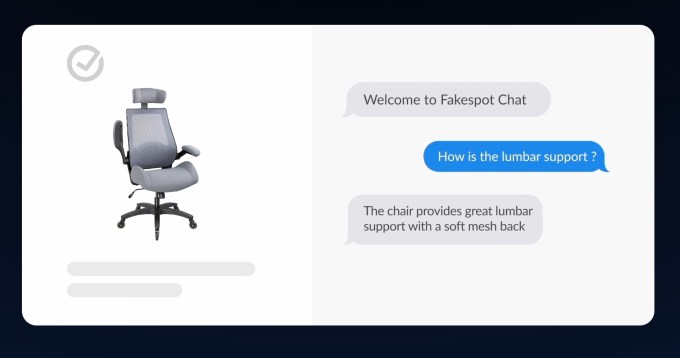Tech news|09.11.2023
Fakespot Chat, Mozilla’s first LLM, lets online shoppers research products via an AI chatbot
Earlier this year, Mozilla acquired Fakespot, a startup that leverages AI and machine learning to identify fake and deceptive product reviews. Now, Mozilla is launching its first LLM (large language model) with the arrival of Fakespot Chat, an AI age
Fakespot Chat, Mozilla’s first LLM, lets online shoppers research products via an AI chatbot
Sarah Perez@sarahpereztc / 1:40 AM GMT+7•November 9, 2023
Comment

Image Credits: Mozilla Fakespot
Earlier this year, Mozilla acquired Fakespot, a startup that leverages AI and machine learning to identify fake and deceptive product reviews. Now, Mozilla is launching its first LLM (large language model) with the arrival of Fakespot Chat, an AI agent that will help consumers as they shop online by answering questions about the product or even suggesting questions that could be useful in your product research.
There’s some irony in using AI to combat the scourge of fake reviews, which are today also often crafted using AI technology, like GPT. As CBNC reported in April, a number of Amazon product reviews were transparently created via ChatGPT as they began with the phrase “As an AI language model,” which tends to be part of ChatGPT’s responses. In July, TripAdvisor told The Guardian it had already removed over 20,000 reviews it believed contained AI-generated text from across more than 15,000 properties in its system. The U.S. Federal Trade Commission has also proposed a rule that would attempt to ban fake product reviews, warning that AI is making the problem even worse.
But Fakespot has been using AI, including generative AI technologies, to make the online shopping process more trustworthy, not less. For instance, it launched a generative AI feature called Pros and Cons last year, that could replace the need for reading reviews by writing up its own summaries of a product’s positives and negatives. The feature was trained on billions of data points, with the model itself using five different models under its hood, the company said.

Image Credits: Mozilla Fakespot
This week, Fakespot Chat launched into testing, allowing shoppers to ask an AI chatbot about a product they’re considering, similar to how you could ask a salesperson for help if you were shopping in a physical store in the real world. The technology uses AI and machine learning to sort through the product reviews, sorting real from fake, to answer the user’s questions. The information from your chat session is saved to improve the experience for others, Mozilla notes, but users don’t have to create an account or divulge personal information for the experience to work.
The feature is available via the Fakespot Analyzer or it can be used on an Amazon.com product from Fakespot’s browser extension. For the former, you’d copy and paste the URL of the product into the analyzer to ask your questions, but if using the browser add-on, the analysis starts automatically. When the analysis is complete, Fakespot Chat appears on the right-hand side of the analysis page alongside other features, like Pros and Cons, as well as Fakespot’s Review Grades and Highlights. You can then interrogate the AI agent about the product as you weigh your purchase decisions.
The product joins other Mozilla-led AI initiatives, including a $30 million commitment to build a startup and community called Mozilla.ai focused on creating an independent open source AI ecosystem. It also hosted its first Responsible AI Challenge which encouraged builders to compete for prize money by creating trustworthy AI solutions.
Mozilla admits its new AI chatbot may not always get things right, so it invites users to submit feedback if they think the model could be improved.
“Ultimately, our goal with Fakespot Chat is to reduce your product research time and lead you to better purchasing decisions,” said Saoud Khalifah, founder and director of Fakespot at Mozilla, in an announcement.
